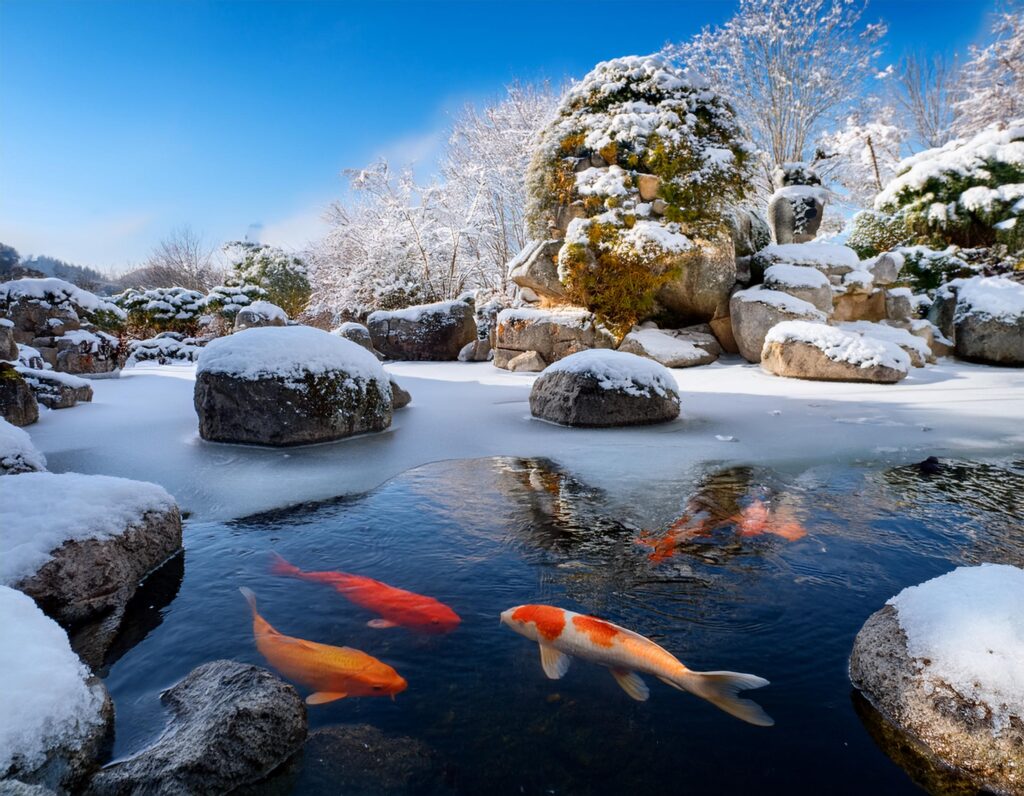
Can a Pond Freeze Solid in New Jersey? Essential Pond Depth Tips
Winter in New Jersey can bring freezing temperatures that affect outdoor ponds and their inhabitants. If you’re worried about your pond freezing solid, it’s essential to understand how pond depth plays a role in preventing total freezing and keeping fish safe. Here’s a guide to help you protect your pond and fish during New Jersey’s coldest months.
1. Understanding Pond Freeze Depth in New Jersey
In New Jersey, pond surfaces can freeze over quickly in winter, especially during prolonged cold spells. However, the likelihood of a pond freezing solid depends largely on its depth. Typically, ponds with a depth of
3 feet or more are safe, as deeper water will not freeze solid. Even when the surface is fully frozen, fish can survive by staying in the warmer water below.
- Tip: For koi ponds, aim for a depth of at least 3 to 4 feet to provide a stable winter environment for your fish.
2. Why Pond Depth Matters for Fish Survival
As water cools, it becomes denser, sinking to the bottom of the pond. In winter, this results in a warmer layer of water below the ice, where fish can remain safely. Shallow ponds (less than 2 feet deep) are at a higher risk of freezing solid, which poses a severe risk to fish. When a pond is deep enough, fish can stay in the unfrozen layer, allowing them to enter a state of dormancy until temperatures rise.
- Consideration for Smaller Ponds: If your pond is shallower than 2.5 feet, consider additional insulation methods or using a pond heater to maintain a safe environment for fish.
3. Preventing Complete Surface Freezing
Even if your pond has adequate depth, keeping an open section on the surface is important for gas exchange. When a pond freezes over entirely, toxic gases from decaying organic matter can build up, while oxygen levels drop. An ice-free opening allows these gases to escape and lets oxygen enter, ensuring a safer habitat for fish.
- Tip: Use a pond de-icer or floating heater to create and maintain a small opening in the ice, or consider an aerator positioned near the surface to keep water circulating.
4. Signs of Unsafe Freezing Levels
If your pond consistently freezes over entirely, or if you notice that the ice is thicker than expected, it may indicate that the pond depth is inadequate or that your winter maintenance routine needs adjustment. Signs that your pond needs attention include:
- Unusual Fish Behavior: If you observe fish swimming close to the ice or moving erratically, it may mean oxygen levels are too low.
- Persistent Ice Thickness: Ponds in areas without sunlight may experience thicker ice. Clearing snow from the pond’s surface can help absorb heat from the sun, reducing the ice layer’s thickness.
5. Adding Insulation for Extra Protection
Adding insulation can help retain heat and prevent a shallow pond from freezing solid. Options include:
- Floating Objects: Using floating pond balls or Styrofoam discs on the surface helps reduce ice formation.
- Pond Covers: A greenhouse-style cover can trap solar heat, insulating the pond and keeping it warmer.
For New Jersey pond owners, these options are especially helpful during extended periods of extreme cold.
6. Using Pond Heaters or De-Icers as Needed
In extremely cold weather, a pond heater or de-icer is essential to prevent complete freezing. These devices are energy-efficient and help maintain a small area of open water, ensuring oxygen exchange. Place the de-icer or heater in an area that’s easy to reach for regular checks, ideally near the pond’s edge to avoid disturbing the fish.
- Energy-Efficient Option: Look for thermostatically controlled de-icers, which only turn on when needed, saving energy and maintaining the right conditions for your pond.
7. Routine Winter Checks on Your Pond
Performing routine checks on your pond throughout winter is a good way to prevent issues before they become serious. During New Jersey’s coldest months, check that the de-icer is functioning, and that no excessive ice buildup is forming. This is also a good time to observe any changes in fish behavior to ensure their safety.
Final Thoughts
With proper depth and winter maintenance, your New Jersey pond can endure the winter freeze safely. Ensuring your pond is at least 3 feet deep, maintaining an open surface, and adding insulation or a de-icer will protect your fish and help them thrive even through freezing conditions. A little preparation goes a long way in keeping your pond ecosystem healthy all year round.
Need help winterizing your pond? Contact Atlantis Water Gardens to get started before your pond freezes!
Read more information on winter pond care and tips, and videos on winter topics at these links:
For more content with tips, tricks and amazing water feature goodness, check us out on
YouTube!
